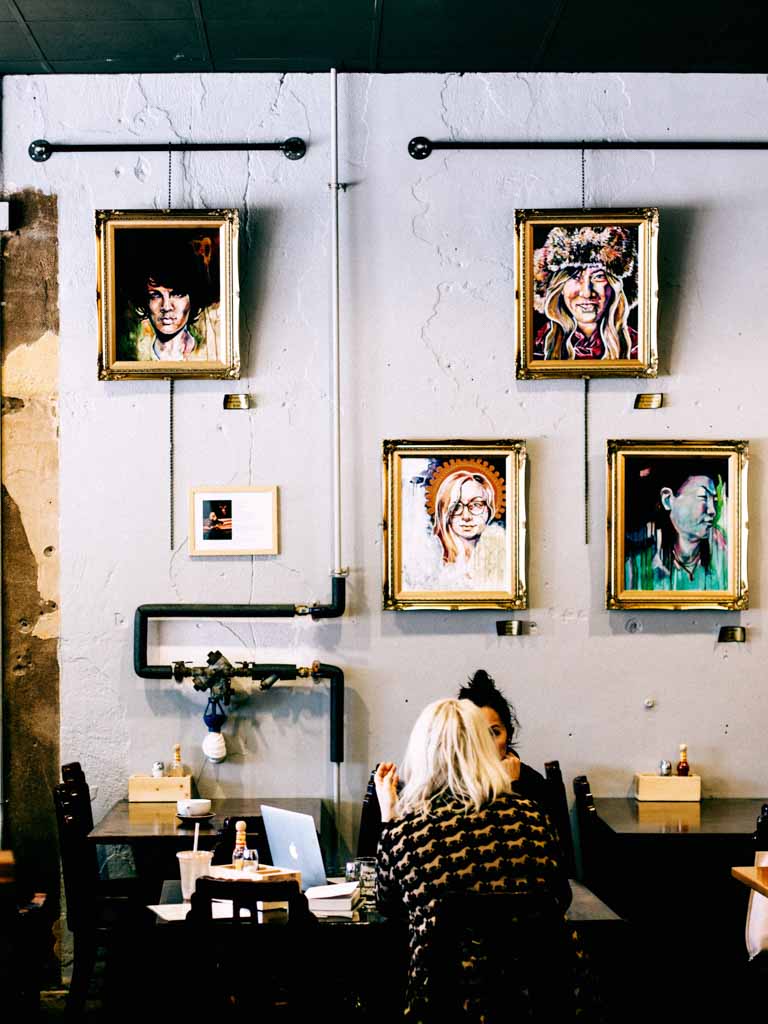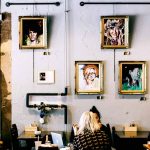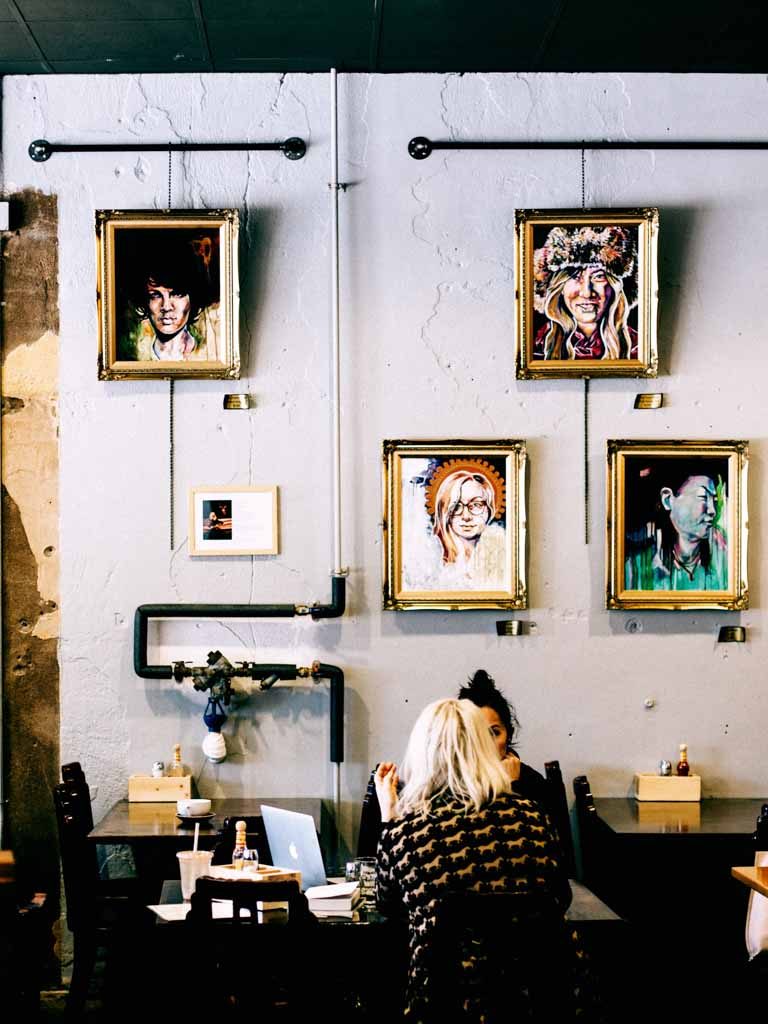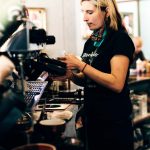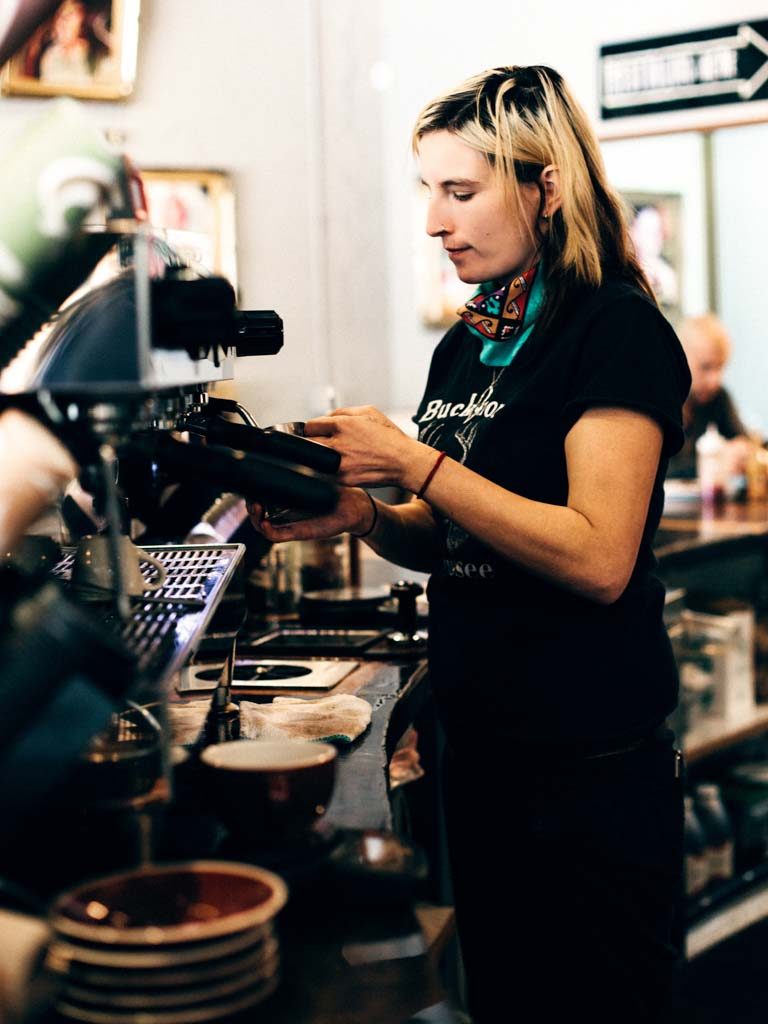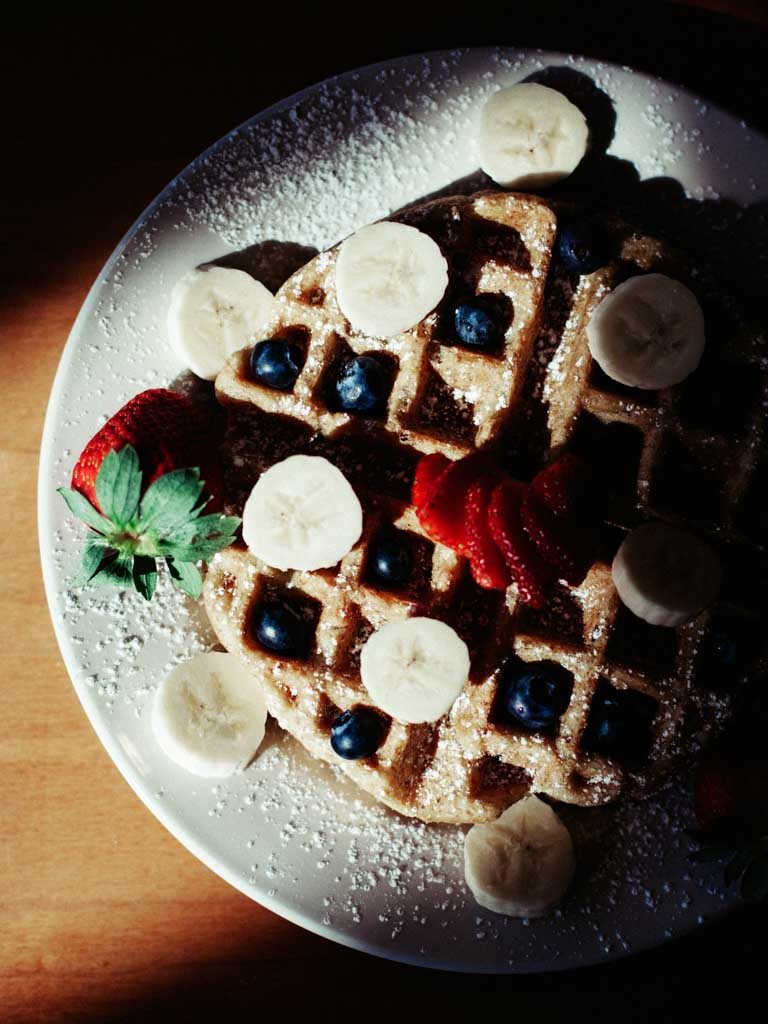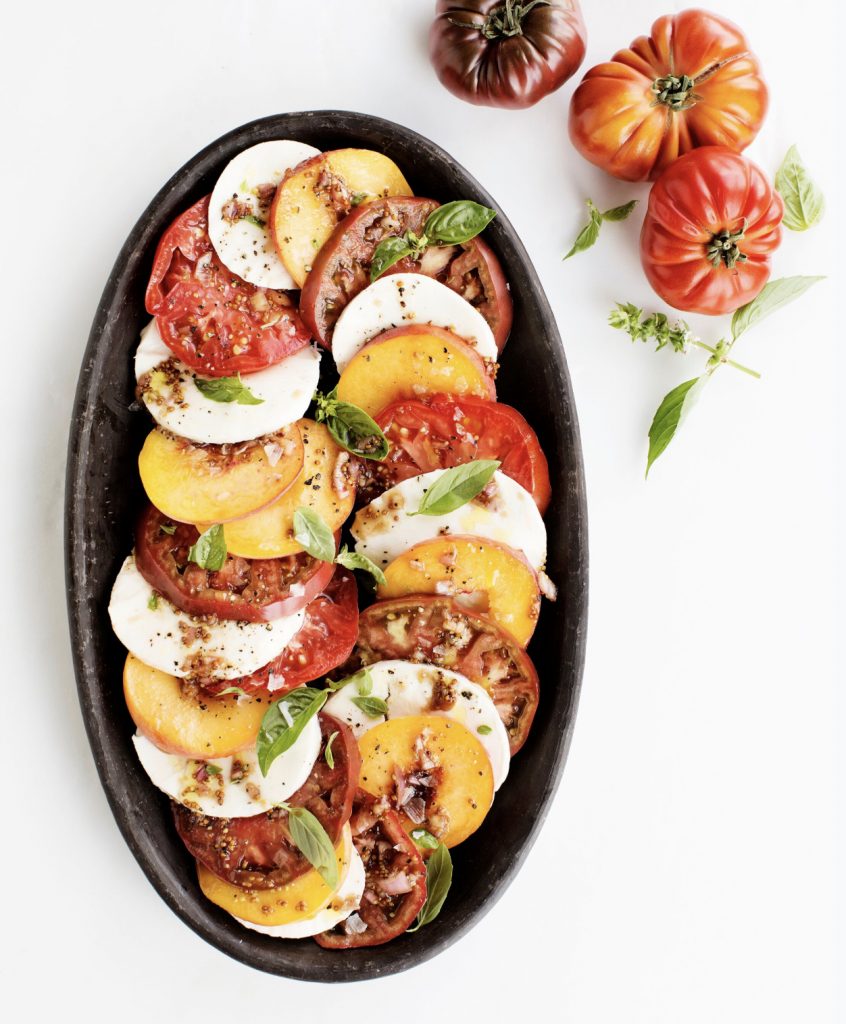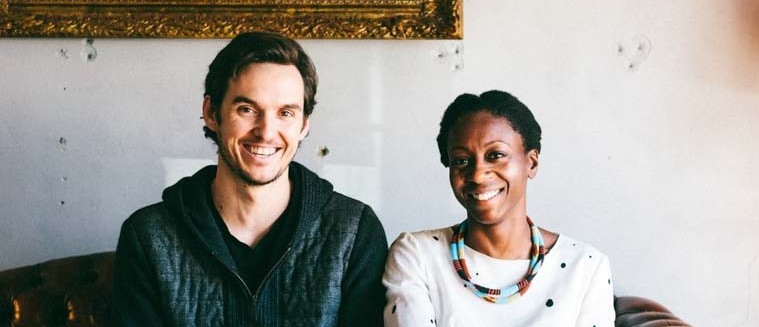
IN THE WORST-CASE SCENARIO of a coffee shop that might be considered trendy, you may imagine white walls, seats you’re not sure how to feel comfortable in, and silent people with laptops and phones in front of their eyes—a place where you’ll find minimalism to the point of intimidation and “artisan” to the point of pretension. Now imagine the complete opposite, and you have an idea of what The Post East is all about.
As I walk in, I immediately feel welcomed. The building is warm and inviting. The first thing I see is the wooden sculptural piece designed by local artist Martin Cadieux.
People around me seem at ease and social, and the owners, Tonya Lewis and her husband, Chris Cowley, notice me and introduce themselves long before I even have to worry about finding them in the full and bustling café. I have a feeling that even if I weren’t the writer who was scheduled to meet them, they still would have introduced themselves and made me feel as if I had walked through the doors of a place where I belonged. That’s just their vibe.
Tonya is a Nashville native with a professional background in school counseling. “I studied human and organizational development, and I was a school counselor for seven years prior to opening The Post,” she explains to me. “My fifth year into counseling, I just decided that I needed a career change. Being in a school setting was great, but I realized that is not what I really was passionate about.” In fact, it was actually her students that made her realize that she could pursue her own passions seriously. After witnessing so many of them turning their dreams into careers, she realized there was nothing keeping her from doing the same thing.
Chris and Tonya met eight years ago. Chris is also a sound engineer and works in video editing at Quaver Music. “Tonya came up with the idea of the coffee shop,
and I thought it was a fantastic idea,” he says. “I just kind of support in every way I can, sort of behind the scenes.”
They began making juices back in 2011 before she left her counseling job and started selling them at local farmers’ markets. The original plan was to keep The Post exclusively juice, but the idea grew into a juice and coffee infusion. “I’ve always enjoyed coffee shops. I love the ambience, I love connecting with people, and I love the community. We did the research and went to Chicago and started talking to different roasters and meeting with people who own coffee shops to see if we had what it would take to open a coffee shop.”
Pretty soon after adding coffee to the idea of The Post, they met and partnered with local baker Nicole Wolfe of Wolfe Gourmet Cakes. “It kept growing from this idea of doing just juice to an actual café,” Tonya explains.
It took time, but eventually Tonya’s dream of this space for the neighborhood began to take shape. “Something starts out on paper and you think, I want to open a coffee shop, but you don’t realize the amount of time and work it takes to actually do something like this. We conceived the idea around 2011, but it was not until around 2013 that I actually started fleshing out a business plan and trying to put my ideas on paper of what the coffee shop would look like. We partnered with David Hunter, a local architect who lives in the neighborhood and owns a design house. He was the person we went to and said, ‘Can you help us come up with an actual design idea for the space?’ And after meeting with him we also brought on Martin Cadieux, who is a local East Nashville artist, and pitched the idea to him and asked what we could do in terms of being different and creating a really unique space.”
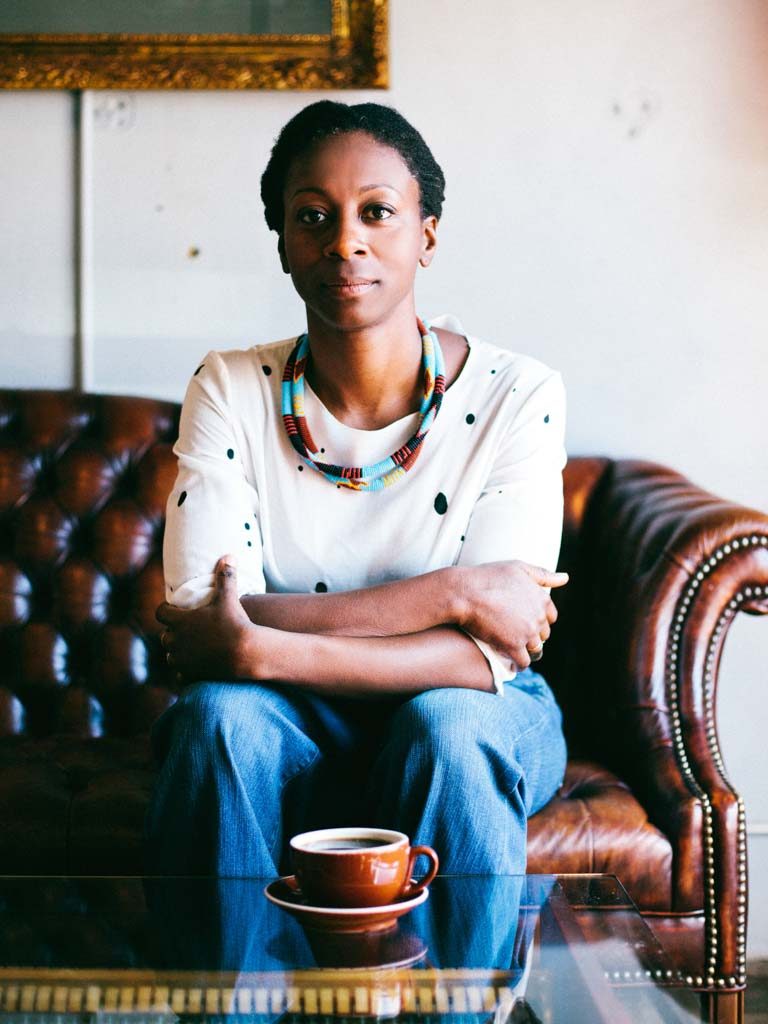
Almost everything that makes up the interior has been repurposed from something else. Chris built the tables himself, and he made the chandelier and pendant lights over the bar from recycled bicycle chains from Halcyon and Eastside Cycles. The coffee table beneath the chandelier was made from a repurposed piano. The portholes in the juicing area were made from old whiskey barrels. “We went into it with the intention of being a sustainable business. Most of the stuff we offer here in terms of food is organic. We are definitely 100 percent organic when it comes to our smoothies and juices, and we use all compostable material in terms of our to-go packaging, forks, and spoons.”
“We just kind of brought our own personal philosophy into it,” Chris adds, “which was we only want the best for our bodies, so why not offer that . . . we know so many people in the community that want the same thing, and it was kind of hard to find that over here, so we thought we should provide that. And then [we] also [saw] the physical spot itself just becoming a sort of community hub. Tonya’s previous job was communicating with people, and the idea of this was to build a spot for people to come together and share ideas and meet each other and bring the neighborhood together.”
It is also worth mentioning that they have become the East Nashville spot for gluten-free and vegan food items. “The idea was to offer things that people who are glutenintolerant and who have autoimmune diseases could eat and enjoy. And one of the big things we kept hearing was that when people would find a place that would offer it, it wasn’t up to the standards or quality that they wanted.”
Chris’ sister, Lauren, moved to Nashville from Port Townsend, Washington, to help them get things off the ground. “She had attempted to start her own gluten-free business there,” Chris explains. “When it didn’t work out, we asked if she would be interested in helping, and she came to Nashville, relocated, and really kicked off the entire gluten-free thing we have going now.”
Tonya is rare in that she is an East Nashville native, and Chris has lived in East Nashville for ten years. I ask Tonya how being a native has affected the way she views the East Nashville community. “There’s some good things that come along with development and then there’s the downfall,” she says. “The diversity, I wish it was better, but it’s a double-edged sword because there are people coming in now and restoring buildings and making them more beautiful. I’m trying to be positive about it because, again, we were fortunate to [open The Post] in a neighborhood that is pretty much established and not a developing community.”
A customer apologizes for interrupting but wants to say hi to Tonya and Chris. They seem to have a lot of regulars that they have really gotten to know on a personal level. “People love the energy of this place,” Tonya says. “They love the design, and you walk in and it just feels like, Wow I can relax, I don’t have to be on guard. I don’t have to be something or have an agenda. We just want people to feel accepted and welcomed.”
“I remember when we first opened,” Chris says. “We had two neighbors that came in, and both had lived in their homes for five years . . . And they came and they met each other for the first time and were like, ‘Hey, aren’t we neighbors?’ And now they’re great friends because they see each other in here all the time.”
The name itself is meant to represent a sort of meeting place for people. “People ask me why it’s called The Post, and actually two of my friends came up with the name and I thought it was really clever,” Tonya says. “Back in the day, when people wanted to meet up, they would go to the meeting post. I was thinking about when you translate that into today’s terms, when people want to connect, what do they do? They get on Instagram, they go on Facebook, they go on Twitter, and they make a post. So I was thinking, Why not create a community hub, a space where people can come and post up and connect there rather than online? That’s what I think is missing a lot of the time. People don’t have that ability to have a face-to-face connection that allows us to really grow together and learn, and that’s what builds community to me.”

The Post also acts as a space for community events. “I am a big proponent of using the coffee shop as a public forum for art, music, poetry, and political discourse around real-life issues,” Tonya says. “One of the things we have coming down the pike, and something I am really excited about, is an ongoing Mobile Soul Café event in the upcoming months to celebrate the influence and legacy of black soul music. This event is the brainchild of Eric Dozier, a cultural activist, theologian, musician, and father. Eric is the former musical director for the worldfamous Harlem Gospel Choir, and he is a badass!”
In addition to Mobile Soul Café, every second Tuesday of the month Chuck Beard, owner of East Side Story, puts on East Side Storytellin’, an event where local writers, musicians, and poets read and perform in order to highlight the literary community of Nashville. The Post has also started offering a mindfulness meditation class that is free and open to anyone. Most Saturdays there’s live music, and on Sundays, they host Bluegrass Brunch, which is organized by Keenan Wade of the Farmer and Adele.
As far as the future of The Post goes, Tonya and Chris want to focus on refining what they’re already doing and potentially even taking the concept to another part of town. But for now, they’re taking it one step at a time. “It’s kind of been this organic growth where the people that need to find us, find us,” Tonya says.
“As business owners, we care more about creating a space for people to make genuine heart and soul connections than we do about being considered a popular or trendy place to go. To Chris and me, having the ‘cool spot to hang’ title is a bit outdated and has no real merit or credibility as far as we are concerned. In the long run, people care more about you keeping it real,” Tonya explains. “I personally strive to get intimately connected with the nitty-gritty details of what’s going on in our customers’ lives. I want to know who they are, where they’re from, what they’re doing, and what is going on in their lives. This innate tendency to want to probe and dig a little deeper stems from my years of training as a counselor—I guess you can call it the omnipresent counselor in me. This trait may not bode well for the customers who desire a bit of anonymity and privacy, and for these people, I respect and honor these boundaries. However, my desire to create an atmosphere that leads to ‘authentic human connection’ emanates from a place of unadulterated love and empathy. It is the major reason why I do what I do.”
Suggested Content
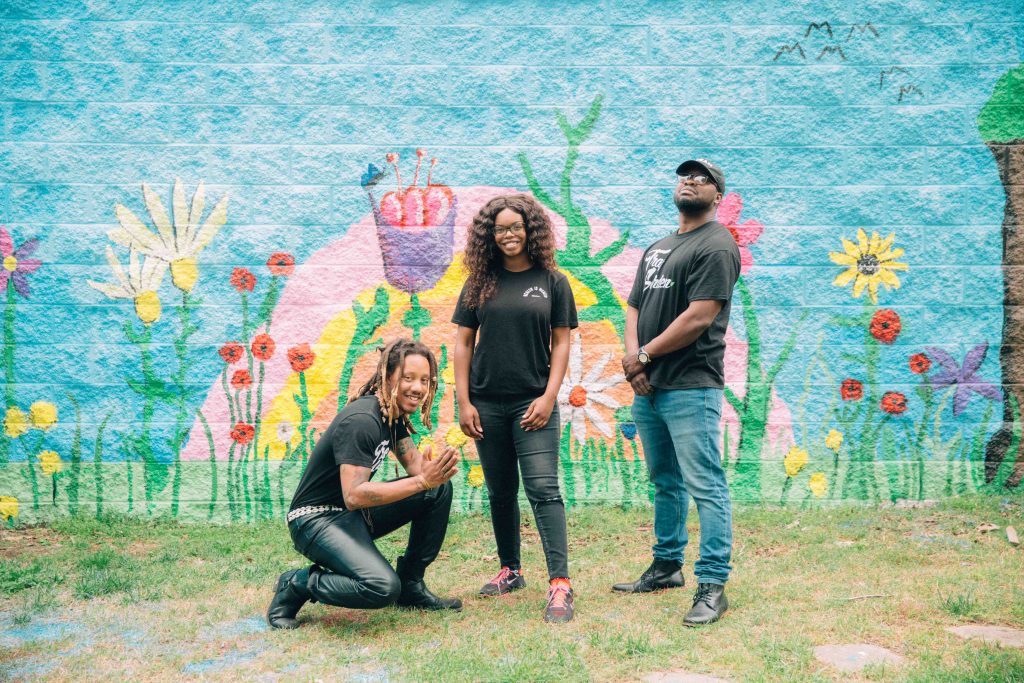
Can You Dig It?
How urban farming nonprofit Trap Garden is working to eradicate Nashville’s food deserts
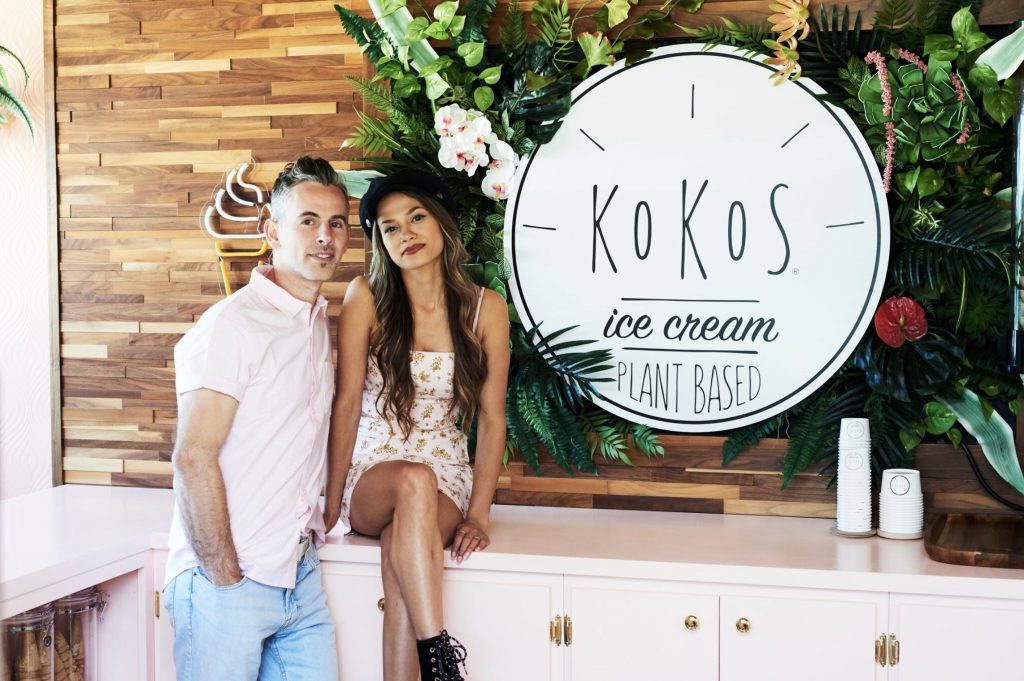
Double Scoop of Happiness
Kokos Ice Cream creators Jerusa van Lith and Sam Brooker want to show you just how good ice cream can be.

